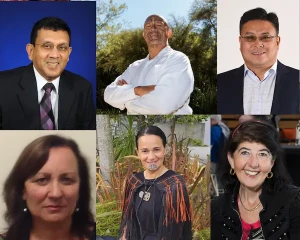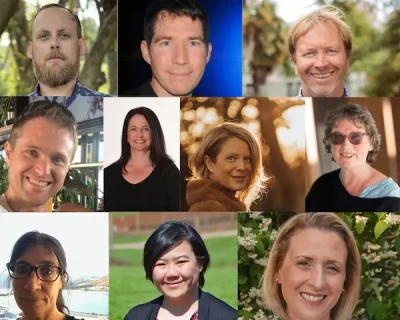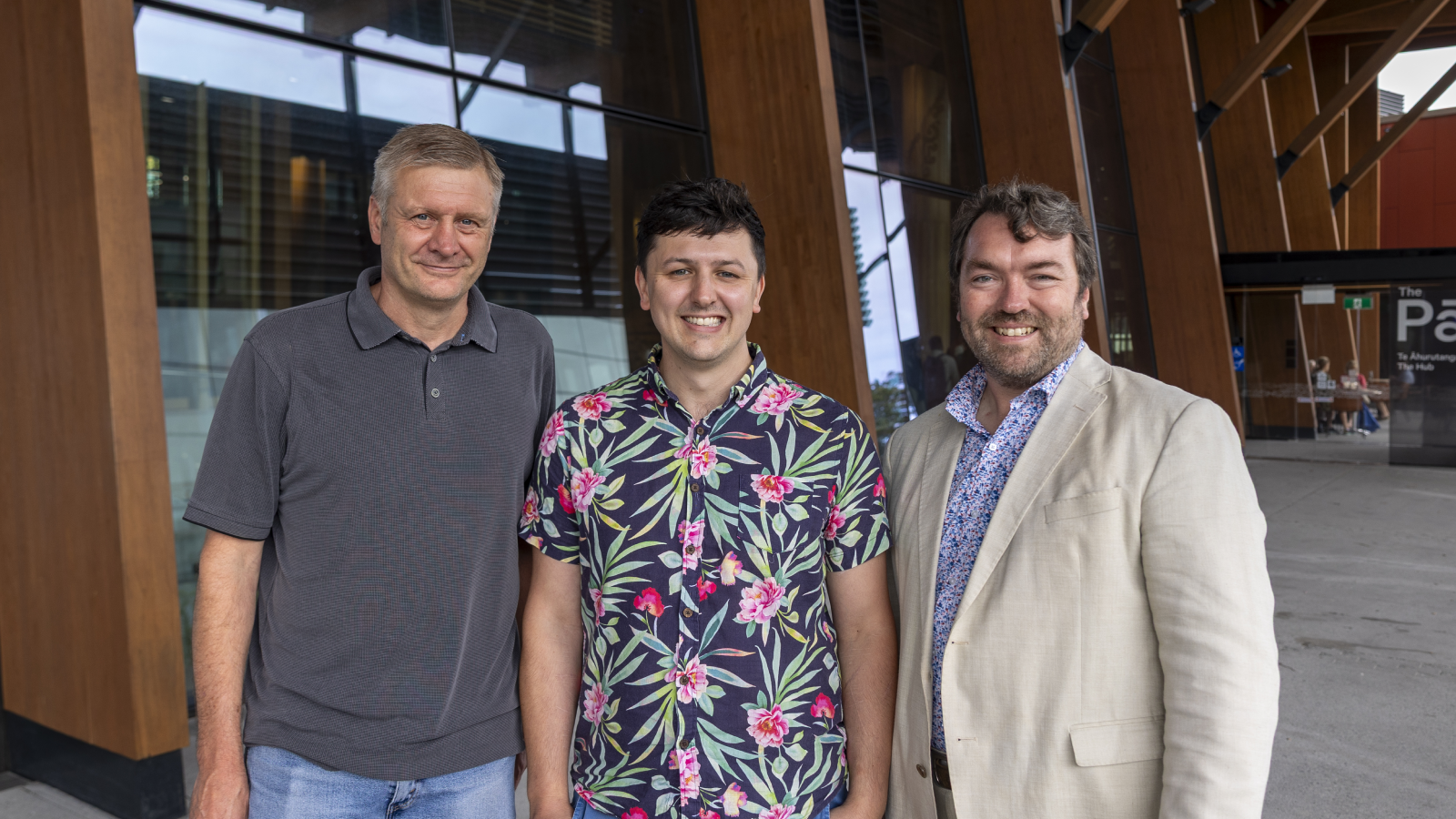Six academics were promoted to Professor and 10 academics were promoted to Associate Professor.
Academic promotions recognise outstanding contributions to research, teaching, student supervision and leadership within the University as well as the achievement of an international reputation in each academic’s area of specialisation.
Promotion to Professor

L-R: Professor Nihal Kularatna, Professor Te Kahautu Maxwell, Professor Fei Yang, Professor Sophie Nock, Professor Waikaremoana Waitoki, Professor Michele Prinsep.
Professor Nihal Kularatna, Te Kura Mata-Ao School of Engineering
Professor Kularatna is a electronics engineer with a background in aviation ground electronics and digital telecommunications. His research focuses include non-traditional supercapacitor applications, power converters, transient propagation and power conditioning, with outputs of journals articles, conference proceedings, reference books and patents.
Professor Te Kahautu Maxwell, Te Pua Wānanga ki te Ao Faculty of Māori and Indigenous Studies
Professor Maxwell (Te Whakatōhea, Ngāi Tai, Ngāti Awa, Te Whānau a Apanui, Ngāti Porou, Tūhoe, Ngāti Maniapoto) is an expert in te reo and tikanga Māori and has a strong background in kapa haka. His expertise is sought out both nationally and internationally and his research topics include Māori religion, prophets, and prophecy, karakia, mōteatea, toi Māori, and cultural capital.
Professor Sophie Nock, Te Pua Wānanga ki te Ao Faculty of Māori and Indigenous Studies
Professor Nock (Ngāti Kūri) has a love for teaching te reo Māori, its maintenance, revitalisation and regeneration. Her
research is Kaupapa Māori-driven, both interdisciplinary and multidisciplinary, integrating the revitalisation of te reo Māori, curriculum, and textbook design, and extending to the health, wellbeing, and housing of kaumātua, concussion recovery among Māori adolescents and children, and the spiritual care within Aotearoa New Zealand’s healthcare system.
Professor Michele Prinsep, Te Aka Mātuatua School of Science
Professor Prinsep is a natural products chemist working on both terrestrial and marine organisms. Her primary interest is in isolating bioactive or novel compounds for potential pharmaceutical, agricultural, or horticultural uses. She also has an interest in chemical ecology, which explores how organisms utilise chemicals in their everyday lives.
Professor Waikaremoana Waitoki, Te Pua Wānanga ki te Ao Faculty of Māori and Indigenous Studies
Professor Waitoki (Ngāti Hako, Ngāti Mahanga) is a clinical
psychologist with interests in kaupapa Māori psychology, mental health, Māori wellbeing, and the social determinants of health. She is currently leading the MBIE-funded WERO – Working to End Racism and Oppression – research project and an HRC project exploring spirituality and wairuatanga in healthcare. She has also been a lead researcher and co-researcher on Marsden and National Science Challenge-funded projects. Her work is employed in hapū, health sectors and NGO services. She credits her start in research to Ngā Pae o te Māramatanga Māori Centre of Research Excellence.
Professor Fei Yang, Te Kura Mata-Ao School of Engineering
Professor Yang is a materials scientist with expertise in physical metallurgy, powder processing and consolidation, and hot processing. His research is focused on thermomechanical processing of advanced materials, and he has previously secured significant funding from the Endeavour and Marsden funds, illustrating the impact of his work on goals to transition to low-emission, climate-resilient economy.
Promotion to Associate Professor

L-R: Dr Martin Atkins, Dr Martyn Beaven, Dr Lars Brabyn, Dr Hamish Crocket, Dr Dianne Forbes, Dr Laura Haughey, Dr Justine Kingsbury, Dr Fiona McCormack, Dr Susan Olivia, Dr Lisa Tompson.
Dr Martin Atkins, Te Kura Mata-Ao School of Engineering
Dr Atkins works in energy systems engineering, with a particular focus on developing and using process integration methodologies for optimising industrial energy systems and emissions reduction.
Dr Martyn Beaven, Te Huataki Waiora School of Health
Dr Beaven is a sports scientist, researching athletic performance, recovery, and wellbeing. He has worked in elite sport around the world, utilising his expertise in exercise physiology and human performance.
Dr Lars Brabyn, Te Kura Toi School of Arts
Dr Brabyn is a geographer focused on developing new and innovative applications of Geographical Information Systems (GIS) and remote sensing, including biodiversity mapping, understanding population change, and the use of drones.
Dr Hamish Crocket, Te Huataki Waiora School of Health
Dr Crocket is a public health researcher focused on creating positive impact for people with diabetes, in particular how technology can be used to provide equity of care and improve quality of life.
Dr Dianne Forbes, Te Kura Toi Tangata School of Education
Dr Forbes is a digital learning specialist with a background in teacher education and a particular interest in blended or hybrid pedagogies in tertiary education. She focuses on student and teacher experiences as digital learning participants.
Dr Laura Haughey, Te Kura Toi School of Arts
Dr Haughey is a theatre maker, director and dramaturg, using inclusive practice and non-hierarchical devising methodologies to facilitate the creation of performances accessible to both d/Deaf and hearing audiences. She is also developing accessible mindfulness-based performance training modalities.
Dr Justine Kingsbury, School of Law, Politics and Philosophy
Dr Kingsbury has two main areas of research: applied epistemology, and biologically-informed philosophy of mind. She is currently investigating issues to do with intercultural understanding and with critical thinking in the public domain.
Dr Fiona McCormack, School of Psychological and Social Sciences
Dr McCormack is a marine and economic anthropologist. She researches the impact of extractivism in ocean environments and local and creative resistances to marine inequality.
Dr Susan Olivia, Te Kura o te Tātaitai, Te Tahua me te Tūpūtea, School of Accounting, Finance and Economics
Dr Olivia is a development economist with interests at the intersections of development, public economics, economic geography, microeconometrics and spatial econometrics.
Dr Lisa Tompson, Te Puna Haumaru New Zealand Institute for Security and Crime Science
Dr Tompson is a crime scientist dedicated to building capacity in crime prevention and reduction across Oceania in ways that move away from dependency on the criminal justice system.



